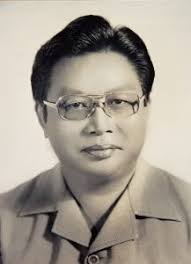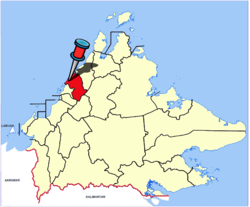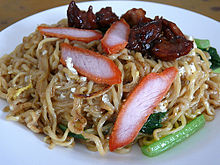
Kota Kinabalu, colloquially referred to as KK, is the state capital of Sabah, Malaysia. It is also the capital of the Kota Kinabalu District as well as the West Coast Division of Sabah. The city is located on the northwest coast of Borneo facing the South China Sea. The Tunku Abdul Rahman National Park lies to its west and Mount Kinabalu, which gave the city its name, is located to its east. Kota Kinabalu has a population of 452,058 according to the 2010 census; when the adjacent Penampang and Tuaran districts are included, the metro area has a combined population of 628,725. The 2020 Census revealed an increase in the municipal population to 500,421, while the wider area including the Penampang and Putatan districts had a population of 731,406.

Dusun is the collective name of an indigenous ethnic group to the Malaysian state of Sabah of North Borneo. Collectively, they form the largest ethnic group in Sabah. The Dusun people have been internationally recognised as indigenous to Borneo since 2004 as per the United Nations Educational, Scientific and Cultural Organization (UNESCO).

Kudat is the capital of the Kudat District in the Kudat Division of Sabah, Malaysia. Its population was estimated to be around 29,025 in 2010. It is located on the Kudat Peninsula, about 190 kilometres (120 mi) north of Kota Kinabalu, the state capital, and is near the northernmost point of Borneo. It is the largest town in the heartland of the Rungus people which is a sub-ethnic group of the majority Kadazan-Dusun race and is therefore a major centre of Rungus culture. It is also notable for being one of the first parts of Sabah to be settled by Chinese Malaysians, particularly from the Hakka dialect group. It is the Northernmost Malaysian city.

West Coast Division is an administrative division of Sabah, Malaysia. It occupies the northwest portion of Sabah. With an area of 7,588 square kilometres, it occupies 10.3% of Sabah's territory. It also has approximately 30% of Sabah's total population, with the main indigenous inhabitants comprising the Bajau, Bisaya, Bruneian Malay, Dusun, Illanun, Kadazan and Kedayan, as well with a significant numbers of Chinese. The division is divided into the districts of Ranau, Kota Belud, Tuaran, Penampang, Papar, and the state capital Kota Kinabalu. The main towns are as in the names of the districts, plus other towns including Putatan, Inanam, Telipok, Tamparuli, Tenghilan and Kinarut.

Kota Belud is the capital of the Kota Belud District in the West Coast Division of Sabah, Malaysia. Its population was estimated to be around 8,392 in 2010. It is roughly at the midpoint of the federal highway connecting the state capital, Kota Kinabalu, and Kudat, near the northern tip of Sabah. The town is considered as the unofficial capital and gateway to the heartland of the West Coast Bajau people.

Beaufort is the capital of the Beaufort District in the Interior Division of Sabah, Malaysia. It was named after former British Governor Leicester Paul Beaufort. Its population was estimated to be around 12,742 in 2010. It is about 90 kilometres south of Kota Kinabalu and about 167 kilometres north of Long Pasia. It has shophouses built high above the roads to avoid the periodic floods of the Padas River. The population of Beaufort is composed mainly of Bisaya, Brunei Malays, Kadazan-Dusuns, Lun Bawang/Lun Dayeh, Muruts and Chinese. Bisaya are the majority ethnic, and the population is scattered around the town. Like other towns in Sabah such as Kota Kinabalu city, Tuaran, Papar, Tawau, Kudat and Tenom, Beaufort was one of the major initial Hakka population centres in Sabah and still has a large Hakka minority.

The Lotud people are an indigenous ethnic group residing in Sabah, eastern Malaysia on the island of Borneo. They reside mainly in the Tuaran district and also a portion of this tribe's population also reside in the village of Kampung Sukoli located in the Telipok suburban township of Kota Kinabalu city, all located in the West Coast Division of Sabah. Their population was estimated at 5,000 in the year 1985 but now believed to be more than 20,000. They are a sub-ethnic group of the Dusunic group, now also known as Kadazan-Dusun.

Tamparuli is a small town and a sub-district of Tuaran on the west coast of Sabah, Malaysia located just off the Kota Kinabalu - Sandakan road, making it a stop for a snack or meal for travelers taking this route from the direction of Kota Kinabalu. The town is also a stop en route to the town of Kiulu, a whitewater rafting destination for domestic and foreign tourists. It is populated mainly by native Dusuns, while a sizeable Chinese community runs most of the shops in the town proper.

Menggatal or Manggatal is a Malaysian town and suburb of Kota Kinabalu District on the west coast of Sabah. It is an suburb of the state capital, Kota Kinabalu, and is under the jurisdiction of Kota Kinabalu City Hall. It is located along Jalan Tuaran Lama, which is the main road leading north from Kota Kinabalu city centre all the way to neighbouring Tuaran District.

Kinarut is a town in the state of Sabah, Malaysia. It is located about 20 kilometres south of the state capital, Kota Kinabalu, and Kinarut railway station is one of the stops on the Sabah State Railway. Kinarut is under the administration of the Papar District.

Datuk Seri Panglima Wilfred Madius Tangau is a Malaysian politician who has served as the Member of Parliament (MP) for Tuaran from November 1999 to March 2008 and again since May 2013. He served as the Deputy Chief Minister and State Minister of Trade and Industry of Sabah in the Sabah Heritage Party (WARISAN) state administration from May 2018 to the collapse of the WARISAN administration in September 2020, Minister of Science, Technology and Innovation from July 2015 to May 2018. He is a member of the United Progressive Kinabalu Organisation (UPKO), a component party of the PH coalition. He has served as the Honorary President of UPKO since January 2023, 2nd President of UPKO from March 2014 to January 2023, when he served in the official capacity from September 2018 to January 2023 and acting capacity from March 2014 following the resignation of Bernard Giluk Dompok to his official assumption of UPKO presidency in September 2018.
Tun Mohd Hamdan bin Abdullah was the fourth Governor of the Malaysian state of Sabah.

Sabahan cuisine is a regional cuisine of Malaysia. As in the rest of Malaysian cuisine, Sabah food is based on staples such as rice with a great variety of other ingredients and different methods of food preparations due to the influence of the state's varied geography and indigenous cultures that were quite distinct from the regional cuisines of the Peninsular Malaysia. Sabah along with its neighbour of Sarawak is famous for their multi-ethnic population.

Sabah is the third most populous state in Malaysia, with a population of 3,418,785 according to the 2020 Malaysian census. It also has the highest non-citizen population, at 810,443. Although Malaysia is one of the least densely populated countries in Asia, Sabah is particularly sparsely populated. Most of the population is concentrated along coastal areas, with towns and urban centres seeing the most population growth.

The Kota Kinabalu District is an administrative district in the Malaysian state of Sabah, part of the West Coast Division which includes the districts of Kota Belud, Kota Kinabalu, Papar, Penampang, Ranau and Tuaran. The capital of the district is in Kota Kinabalu City.

The Papar District is an administrative district in the Malaysian state of Sabah, part of the West Coast Division which includes the districts of Kota Belud, Kota Kinabalu, Papar, Penampang, Putatan, Ranau and Tuaran. The capital of the district is in Papar Town.

The Putatan district is an administrative district in the Malaysian state of Sabah, part of the West Coast Division which includes the districts of Kota Belud, Kota Kinabalu, Papar, Penampang, Ranau and Tuaran. The capital of the district is in Putatan Town.

The Tuaran District is an administrative district in the Malaysian state of Sabah, part of the West Coast Division which includes the districts of Kota Belud, Kota Kinabalu, Papar, Penampang, Putatan, Ranau and Tuaran. The capital of the district is in Tuaran Town.

Tenghilan is a small town and mukim under the administration of the Tamparuli minor district office. It is located in the Tuaran District of the West Coast Division of Sabah, Malaysia. The Tenghilan area is centered around a small town of the same name located near the road that connects Kota Kinabalu and Kota Belud. In 2010, its population was estimated at 203 inhabitants, mostly of Kadazan-Dusun origin. The town, which covers about 400 hectares of land, is located about 17 km northeast of Tuaran, and 25 km southwest of Kota Belud.

James Peter Julitih Ongkili was a Malaysian politician. He was the Minister in the Prime Minister's Department from 1983 to 1986 and Deputy Chief Minister of Sabah from 1976 to 1981. He was also the Member of Sabah State Legislative Assembly for Tamparuli from 1976 to 1981 and Member of Parliament for Tuaran from 1978 to 1986.





















